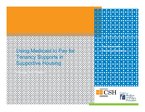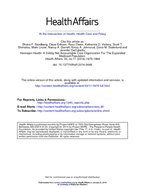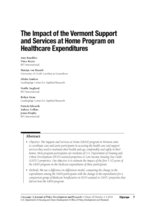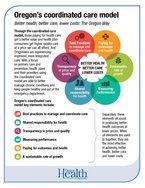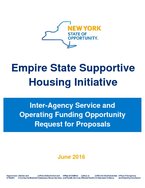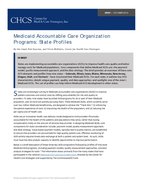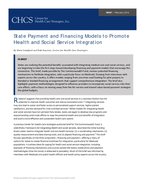Found 39 resources.
0
0
0
Scope of Practice article on the American Medical Association's website
Topics: Cost effectiveness, Health
 Shared by Camille Anoll-Hunter
on Aug 26, 2021
Shared by Camille Anoll-Hunter
on Aug 26, 2021 0
0
0
This report focuses on the homelessness and health care use of older homeless adults in New York City, specifically those 55 years of age or older. Recent evidence suggests a unique cohort effect of postWorld War II “baby boomers” born between 1955 and 1965 who have shown a disproportionately high
risk of homelessness over the last two decades.
Topics: Cost effectiveness, East Coast, Health, Homelessness, Housing, Low-income, Research, Seniors
 Shared by Housing Is
on Apr 11, 2019
Shared by Housing Is
on Apr 11, 2019 0
0
0
This report is intended to accompany a report entitled The Emerging Crisis of Aged Homelessness: Could Proposed Housing Solutions Be Funded from Avoidance of Excess Hospital and Nursing Home Costs?, which reports on findings from a multi-site study involving the analysis of data from Boston, Los Angeles and New York City. That report is motivated by recent evidence documenting a cohort effect in the single adult homeless population, wherein persons born between 1955 and 1964 have faced a disproportionate risk of homelessness over the past two decades.
Topics: Cost effectiveness, East Coast, Health, Homelessness, Housing, Low-income, Research, Seniors
 Shared by Housing Is
on Apr 11, 2019
Shared by Housing Is
on Apr 11, 2019 0
0
0
Could Housing Solutions be Funded by Avoidance of Excess Shelter, Hospital, and Nursing Home Costs?
Topics: Cost effectiveness, Health, Homelessness, Housing, Legislation & Policy, Research, Seniors
 Shared by Housing Is
on Apr 11, 2019
Shared by Housing Is
on Apr 11, 2019 0
0
0
A whole host of factors — such as friends, housing and transportation — affect a person’s health and how much they need the social safety net. It’s time the government’s big health insurance programs took this reality into account, some lawmakers and policymakers are starting to argue.
Topics: Asset building, Cost effectiveness, Disabilities, Education, Food insecurity, Funding, Health, Homelessness, Housing, Legislation & Policy, Low-income, Medicaid / Medicare, Seniors, Transportation, Workforce development
 Shared by Housing Is
on Jan 25, 2019
Shared by Housing Is
on Jan 25, 2019 0
0
0
Policymakers seek to transform the US health care system along two dimensions simultaneously: alternative payment models and new models of provider organization. This transformation is supposed to transfer risk to providers and make them more accountable for health care costs and quality. The transformation in payment and provider organization is neither happening quickly nor shifting risk to providers. The impact on health care cost and quality is also weak or nonexistent.
Topics: Cost effectiveness, Health, Legislation & Policy, Research
0
0
0
The State of Arizona’s Medicaid agency (AHCCCS) recognizes the vital importance of safe, decent and affordable housing to health. With a portfolio of over 3,000 units of affordable housing for Medicaid members with a determination of serious mental illness (SMI) and/or substance use disorder, housing is a major component of how the State of Arizona assists those trying to recover and stabilize.
Topics: Cost effectiveness, Health, Housing, Low-income, Medicaid / Medicare, Mental health, Partnerships, Substance abuse
 Shared by Housing Is
on Jan 22, 2019
Shared by Housing Is
on Jan 22, 2019 0
0
0

As state and federal officials increasingly search for ways to curb rising health care costs, a decades-old idea is gaining traction: helping people with challenges that have nothing to do with medical care but everything to do with their health.
Topics: Cost effectiveness, Food insecurity, Health, Homelessness, Housing, Low-income, Medicaid / Medicare, Nutrition, Partnerships, Preventative care, Stability, Transportation
0
0
0
Does a screening requirement for homeless families seeking shelter create unintended costs? In 2012, Massachusetts passed a law requiring homeless families seeking shelter to prove that they had recently stayed somewhere not meant for human habitation. Hospital emergency department discharge paperwork can provide such proof. This study explored the trends of emergency department use for shelter by homeless youth before and after the eligibility criteria was passed into law and to measure the financial impact it had on the health care system. Researchers conducted a retrospective analysis of...
Topics: Cost effectiveness, East Coast, Health, Homelessness, Housing, Legislation & Policy, Low-income, Research, Youth
0
0
0
CLPHA’s Housing Is Initiative is engaged in a number of cross-sector activities focused on developing partnerships, facilitating a community of practice, resource development, promoting best practices, online collaboration, policy and advocacy, and training and education. Read about recent activities in this Fall Update.
Topics: Child welfare, CLPHA, Community development, Cost effectiveness, Data sharing, Early childhood, Education, Family engagement, Funding, Health, Homelessness, Housing, Low-income, Medicaid / Medicare, Mental health, Partnerships, Place-based, Post-secondary, Research, Stability, Substance abuse, Workforce development, Youth
0
0
0
Partnerships between medicaid and supportive housing providers
Topics: Cost effectiveness, Funding, Health, Legislation & Policy, Low-income, Medicaid / Medicare, Partnerships, Supportive housing
 Shared by Housing Is
on Aug 9, 2018
Shared by Housing Is
on Aug 9, 2018 0
0
0
The Colorado Coalition for the Homeless created the Denver Housing First Collaborative (DHFC) in 2003 with funding provided by a collaboration of federal agencies. The DHFC involved CCH as the lead agency, Denver Department of Human Services (DDHS), Denver Health (DHHA), Arapahoe House, the Mental Health Center of Denver (MHCD) and the Denver VA Medical Center. The DHFC is designed to provide comprehensive housing and supportive services to chronically homeless individuals with disabilities. Initial federal funding created the capacity to house and serve 100 chronically homeless individuals...
Topics: Cost effectiveness, Funding, Health, Homelessness, Housing, Pacific Northwest, Partnerships, Research, Stability, Supportive housing
 Shared by Housing Is
on Aug 9, 2018
Shared by Housing Is
on Aug 9, 2018 0
0
0
Everyone needs safe, decent, stable housing. For some of the most vulnerable people in America — people with mental illness, chronic health conditions, histories of trauma, and other struggles — a home helps them to get adequate treatment and start on the path toward recovery. But some conditions make it difficult for people to maintain a stable home without additional help. Supportive housing, a highly effective strategy that combines affordable housing with intensive coordinated services, can provide that needed assistance.
Topics: Cost effectiveness, Disabilities, Health, Homelessness, Housing, Low-income, Medicaid / Medicare, Mental health, Place-based, Seniors, Supportive housing
 Shared by Housing Is
on Aug 9, 2018
Shared by Housing Is
on Aug 9, 2018 0
0
0
Health care payment and delivery models that challenge providers to be accountable for outcomes have fueled interest in community-level partnerships that address the behavioral, social, and economic determinants of health.We describe how Hennepin Health—a county-based safety-net accountable care organization in Minnesota—has forged such a partnership to redesign the health care workforce and improve the coordination of the physical, behavioral, social, and economic dimensions of care for an expanded community of Medicaid beneficiaries.
Topics: Affordable Care Act, Cost effectiveness, Health, Low-income, Medicaid / Medicare, Mental health, Metrics, Partnerships, Research
 Shared by Housing Is
on Aug 9, 2018
Shared by Housing Is
on Aug 9, 2018 0
0
0
We sought to learn more about how state- and locally funded rental
assistance programs were created, how they are structured, whom they serve, and how they are funded.
Topics: Cost effectiveness, Data sharing, Disabilities, Family engagement, Funding, Health, Homelessness, Housing, Legislation & Policy, Low-income, Partnerships, Research, Supportive housing
 Shared by Housing Is
on Aug 1, 2018
Shared by Housing Is
on Aug 1, 2018 0
0
0
The Support and Services at Home (SASH) program in Vermont aims
to coordinate care and assist participants in accessing the health care and support services they need to maintain their health and age comfortably and safely in their homes. Most program participants are residents of U.S. Department of Housing and Urban Development (HUD)-assisted properties or Low-Income Housing Tax Credit
(LIHTC) properties. Our objective is to estimate the impact of the first 5 1/2 years of the SASH program on the Medicare expenditures of these participants.
Topics: Cost effectiveness, Dual-eligibles, East Coast, Health, Home visiting, Housing, Legislation & Policy, Low-income, Medicaid / Medicare, Metrics, Seniors
 Shared by Housing Is
on Aug 1, 2018
Shared by Housing Is
on Aug 1, 2018 0
0
0
Anthem’s affiliated health plans and other managed care organizations (MCOs) increasingly are helping Medicaid members who are diagnosed with mental health conditions and substance use disorders (MH/SUD) find stable housing, secure meaningful employment, and address a range of financial and daily life challenges.
Topics: Affordable Care Act, Cost effectiveness, Depression, Funding, Health, Housing, Medicaid / Medicare, Mental health, Nutrition, Substance abuse, Supportive housing, Workforce development
 Shared by Housing Is
on Jul 27, 2018
Shared by Housing Is
on Jul 27, 2018 0
0
0
SAHF members believe that connecting residents of affordable housing with needed supports – such as educational resources or health services – can help vulnerable families and seniors achieve
a better quality of life. SAHF began the Outcomes Initiative to create a common framework for its members to demonstrate with data the impact on residents of providing housing-based services and support in the five key areas listed below.
Topics: Asset building, Cost effectiveness, Dual-generation, Education, Exercise, Food insecurity, Health, Housing, Mental health, Metrics, Nutrition, Safety, Stability
 Shared by Housing Is
on Jul 26, 2018
Shared by Housing Is
on Jul 26, 2018 0
0
0
Through the coordinated care model, those paying for health care get a better value and health plan consumers get higher quality care at a price we can all afford. And Oregonians are experiencing improved, more integrated care. With a focus on primary care and prevention, health plans and their providers using the coordinated care model are able to better manage chronic conditions and keep people healthy and out of the emergency department.
Topics: Cost effectiveness, Data sharing, Health, Metrics, Partnerships
 Shared by Housing Is
on Jul 24, 2018
Shared by Housing Is
on Jul 24, 2018 0
0
0
The first two brief sections set the policy context for the ongoing housing policy debate on the social benefits of housing. Next is a five-section critical review of the last roughly quarter century of housing policy research. This is followed by a discussion of outstanding measurement issues before the concluding section.
Topics: Cost effectiveness, Health, Housing, Legislation & Policy, Low-income, Research, Safety
 Shared by Housing Is
on Jul 23, 2018
Shared by Housing Is
on Jul 23, 2018 0
0
0
Time and again, taking a narrow view of health care has proven ineffective in producing meaningful change. Yet the current
thrust of health care reform remains firmly focused on traditional health care services. Reforms such as care coordination models and patient centered medical homes are necessary but insufficient for homeless populations with complex problems. Pairing such reforms with supportive housing is more likely to result in lasting health improvements and reduced costs.
Topics: Cost effectiveness, East Coast, Health, Homelessness, Housing, Legislation & Policy, Medicaid / Medicare, Place-based, Supportive housing
 Shared by Housing Is
on Jul 23, 2018
Shared by Housing Is
on Jul 23, 2018 0
0
0
States are implementing accountable care organizations (ACOs) to
improve health care quality and better manage costs for Medicaid populations. Core components that define Medicaid ACOs are: the payment model; quality measurement approach; and the data
strategy. This brief provides an overview of these core ACO elements and profiles how nine states -Colorado, Illinois, Iowa, Maine, Minnesota, New Jersey, Oregon, Utah, and Vermont -have structured their Medicaid ACOs. For each state, it outlines key ACO characteristics; details unique payment, quality, and data approaches; and spotlights ...
Topics: Cost effectiveness, Data sharing, Health, Low-income, Medicaid / Medicare, Metrics
 Shared by Housing Is
on Jul 23, 2018
Shared by Housing Is
on Jul 23, 2018 0
0
0
States are realizing the potential benefits associated with integrating medical care and social services, and are beginning to take the first steps toward developing financing and payment models that encourage this connection. This brief, made possible by The Commonwealth Fund, reviews potential financing mechanisms to facilitate integration, with a particular focus on Medicaid. Drawing from interviews with experts across the country, it offers models ranging from one time seed funding for pilot projects to blended or braided financing arrangements that support comprehensive integration. The...
Topics: Cost effectiveness, Funding, Health, Medicaid / Medicare, Partnerships, Supportive housing
 Shared by Housing Is
on Jul 23, 2018
Shared by Housing Is
on Jul 23, 2018 0
0
0
This issue brief outlines ways in which Medicaid can support integrated strategies and, based on telephone interviews with key informants, profiles three current initiatives that illustrate distinctly different approaches to linking Medicaid and supportive housing. The three initiatives include one launched by a city (Philadelphia), one by a state (Louisiana), and one by a Medicaid MCO (Mercy Maricopa Integrated Care in Phoenix, Arizona). They target special populations including homeless individuals, people with a wide range of disabilities, and adults with mental health and/or substance use...
Topics: Cost effectiveness, Health, Homelessness, Housing, Low-income, Medicaid / Medicare, Supportive housing
 Shared by Housing Is
on Jul 20, 2018
Shared by Housing Is
on Jul 20, 2018 0
0
0
The Denver Social Impact Bond program is an initiative aimed at measurably improving the lives of people most in need by driving resources towards better, more effective programs. Social Impact Bonds are a unique type of performance-based contract where private and/or philanthropic lenders loan funds to accomplish a specific objective and are repaid based on whether the program achieves its goals. Denver’s Social Impact Bond program will use funds from lenders to provide housing and supportive case management services to at least 250 homeless individuals who frequently use the city’s...
Topics: Community development, Cost effectiveness, Criminal justice, Health, Homelessness, Housing, Low-income, Mental health, Partnerships, Stability, Substance abuse, West Coast
 Shared by Housing Is
on Jul 17, 2018
Shared by Housing Is
on Jul 17, 2018 

